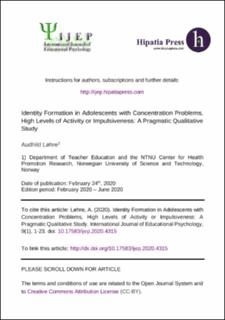Identity Formation in Adolescents with Concentration Problems, High Levels of Activity or Impulsiveness: A Pragmatic Qualitative Study
Peer reviewed, Journal article
Published version

Åpne
Permanent lenke
https://hdl.handle.net/11250/2994391Utgivelsesdato
2020Metadata
Vis full innførselSamlinger
- Institutt for lærerutdanning [3604]
- Publikasjoner fra CRIStin - NTNU [38070]
Originalversjon
International Journal of Educational Psychology. 2020, 9 (1), 1-23. 10.17583/ijep.2020.4315Sammendrag
Students showing core symptoms of ADHD face additional challenges in school. This study asks how children and adolescents with inattentiveness, high levels of activity or impulsiveness perceive their symptom-like behaviour and how this may affect their identity, friendships and well-being. Researchers conducted individual interviews with 12 students (10–16 years) selected to attend a school programme aimed at improving their concentration. Six students had an ADHD diagnosis. The interviews were analysed, guided by theoretical reading. The students’ narratives fit a discursive perspective showing that identity developed through interactions with others. All students told about their disturbing concentration problems. Students disliked having a short fuse and talking before thinking, and they admitted that impulsive behaviour could threaten their friendships. On the other hand, students with high levels of activity described this as fun in interaction with friends. Nobody mentioned that concentration problems affected friendships, and none of the core symptoms seemed to influence well-being. There were no obvious differences between students with or without an ADHD diagnosis. The students’ stories, therefore, show that teachers should know their students with inattentiveness, hyperactivity or impulsiveness individually to learn about their challenges and preferences.
